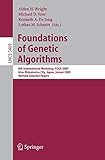Foundations of Genetic Algorithms [electronic resource] : 8th International Workshop, FOGA 2005, Aizu-Wakamatsu City, Japan, January 5-9, 2005, Revised Selected Papers / edited by Alden H. Wright, Michael D. Vose, Kenneth A. De Jong, Lothar M. Schmitt.
Contributor(s): Wright, Alden H [editor.] | Vose, Michael D [editor.]
| Vose, Michael D [editor.] | De Jong, Kenneth A [editor.]
| De Jong, Kenneth A [editor.] | Schmitt, Lothar M [editor.]
| Schmitt, Lothar M [editor.] | SpringerLink (Online service)
| SpringerLink (Online service) .
.
Material type:  BookSeries: Theoretical Computer Science and General Issues: 3469Publisher: Berlin, Heidelberg : Springer Berlin Heidelberg : Imprint: Springer, 2005Edition: 1st ed. 2005.Description: X, 314 p. online resource.Content type: text Media type: computer Carrier type: online resourceISBN: 9783540320357.Subject(s): Computer science
BookSeries: Theoretical Computer Science and General Issues: 3469Publisher: Berlin, Heidelberg : Springer Berlin Heidelberg : Imprint: Springer, 2005Edition: 1st ed. 2005.Description: X, 314 p. online resource.Content type: text Media type: computer Carrier type: online resourceISBN: 9783540320357.Subject(s): Computer scienceGenetic Algorithms for the Variable Ordering Problem of Binary Decision Diagrams -- Gray, Binary and Real Valued Encodings: Quad Search and Locality Proofs -- A Comparison of Simulated Annealing with a Simple Evolutionary Algorithm -- NP-Completeness of Deciding Binary Genetic Encodability -- Compact Genetic Codes as a Search Strategy of Evolutionary Processes -- Asymptotic Convergence of Some Metaheuristics Used for Multiobjective Optimization -- Running Time Analysis of a Multiobjective Evolutionary Algorithm on Simple and Hard Problems -- Tournament Selection, Iterated Coupon-Collection Problem, and Backward-Chaining Evolutionary Algorithms -- A Schema-Based Version of Geiringer's Theorem for Nonlinear Genetic Programming with Homologous Crossover -- Coarse Graining Selection and Mutation -- Perturbation Theory and the Renormalization Group in Genetic Dynamics -- Optimal Weighted Recombination -- On the Prediction of the Solution Quality in Noisy Optimization -- Rigorous Runtime Analysis of the (1+1) ES: 1/5-Rule and Ellipsoidal Fitness Landscapes -- Population Sizing of Dependency Detection by Fitness Difference Classification -- The Deceptive Degree of the Objective Function.
The8thWorkshopontheFoundationsofGeneticAlgorithms,FOGA-8,washeld at the University of Aizu in Aizu-Wakamatsu City, Japan, January 5-9, 2005. This series of workshops was initiated in 1990 to encourage further research on the theoretical aspects of genetic algorithms, and the workshops have been held biennially ever since. The papers presented at these workshops are revised, edited and published as volumes during the year following each workshop. This series of (now eight) volumes provides an outstanding source of reference for the theoretical work in this ?eld. At the same time this series of volumes provides a clear picture of how the theoretical research has grown and matured along with the ?eld to encompass many evolutionary computation paradigms including evolution strategies (ES), evolutionary programming (EP), and genetic programming (GP), as well as the continuing growthininteractionswith other ?elds suchas mathematics,physics, and biology. Atraditionoftheseworkshopsisorganizetheminsuchawayastoencourage lots of interaction and discussion by restricting the number of papers presented and the number of attendees, and by holding the workshop in a relaxed and informal setting. This year's workshop was no exception. Thirty-two researchers met for 3 days to present and discuss 16 papers. The local organizer was Lothar Schmitt who, together with help and support from his university, provided the workshop facilities. Aftertheworkshopwasover,theauthorsweregiventheopportunitytorevise their papers based on the feedback they received from the other participants.


There are no comments for this item.